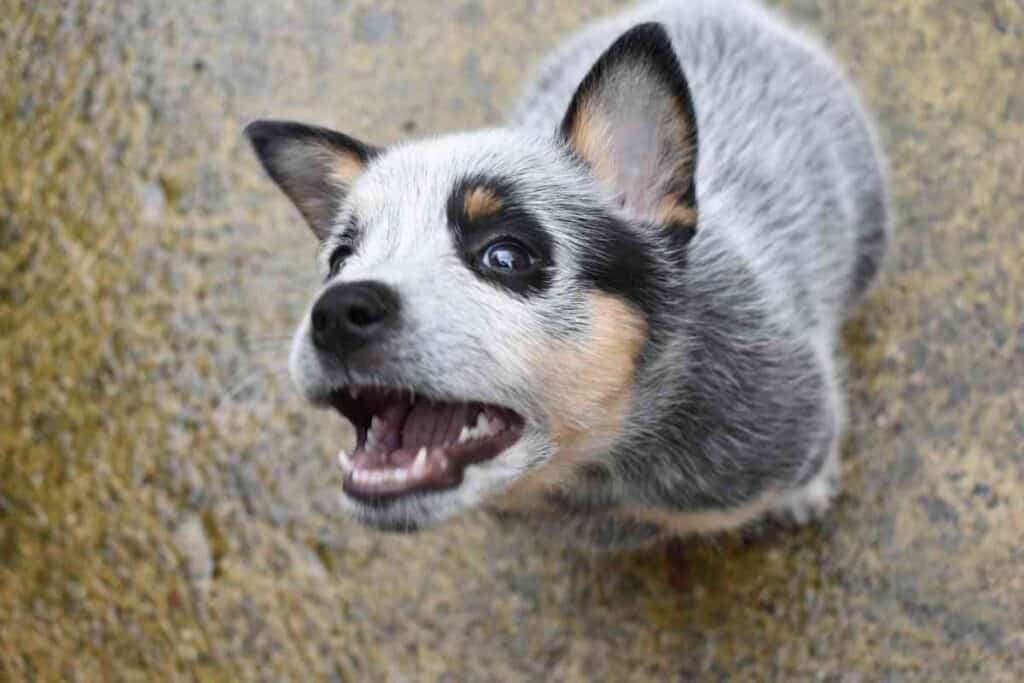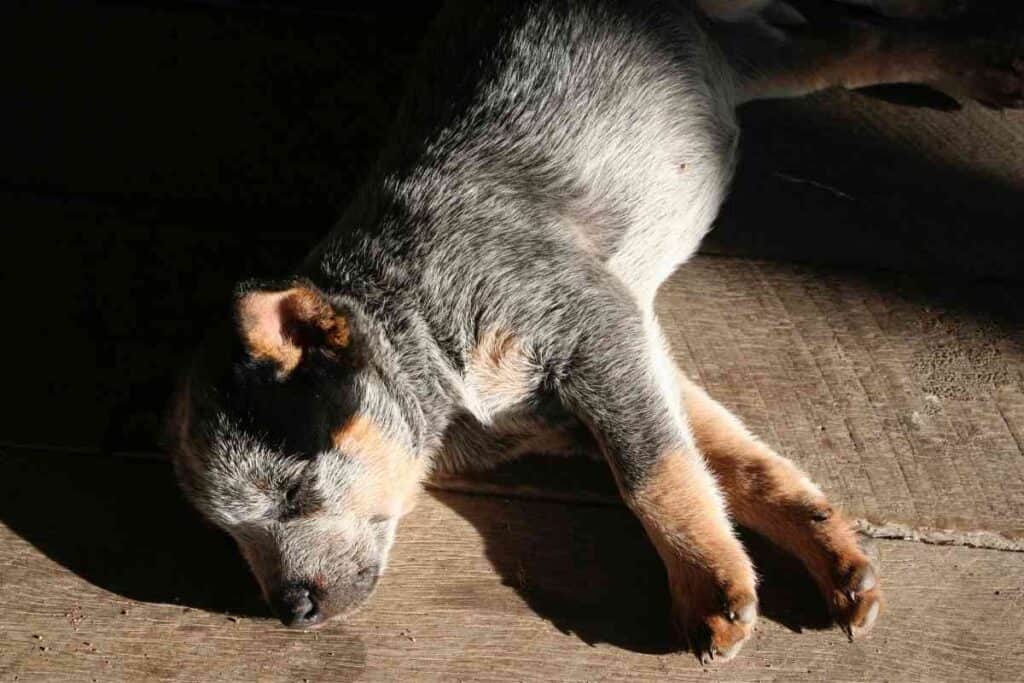When Do Blue Heeler Puppies Stop Biting (And How Do You Stop It)?

Few things are cuter than a Blue Heeler puppy, but the flip side is that they are often biters. It’s nice to think that this behavior will go away with age, but there’s a good chance they won’t just grow out of it alone.
If that’s the case, you need to know what to do to get your Blue Heeler puppy to stop biting.
When Do Blue Heeler Puppies Stop Biting?
Blue Heeler puppies will never completely stop biting, but their habits can be managed with training and redirecting. This habit is partly due to their breed background and related to what they learn and how they are trained.
Biting for a Blue Heeler is part of who they are as a dog.
Bred to herd cattle, biting or nipping has historically been a natural part of their occupation and lifestyle.
When they herd the cattle, they would do it by whatever means they needed.
This management of the herd might include them biting or nipping the cattle to keep them in line.
Aside from this, the Blue Heeler is an independent-thinking dog breed.
Combine that with determination and skill, and they are sure to get any job done well, including controlling cattle.
By fair means or foul, the Blue Heeler would historically work using their biting and nipping to control the herd and successfully do their job well.
If one within the herd had its own mind, the Blue Heeler would continue with its methodology and eventually win the day.
Unfortunately, this innate nature can sometimes make their biting or nipping hard to manage.
In comes obedience training and the right tools to get the job done.
Breeding out of the way, puppies of every dog breed bite and nip from time to time.
This is especially true during teething time when their teeth are developing.
This need to bite or chew something is not related to their breed background.
It is related to their need for relief from pressure, pain, and discomfort that comes with developing teeth.
This process of teething, which starts early in their puppy months, can last for quite a while.
It can be challenging for some pet parents to manage, but having the right chew toys can help.
It is also helpful for the pet parents to have the right mindset and attitude about this phase in their puppy’s life.

Stress, anxiety, anger, or harsh treatment can be harmful and send your Blue Heeler puppy the wrong message.
A simple NO BITE is warranted if a Blue Heeler puppy bites their loved ones during this phase.
Once that is done, the pet parent can temporarily remove themselves.
This phase should usually end with time, but the Blue Heeler puppy will never stop biting.
This must always be kept in mind, and training should be geared towards this end.
They should learn to be true to their innate breeding and nature but respectful of others.
They should have an outlet for breeding where they can herd and work within the family or community.
How do I train my Blue Heeler puppy NOT to bite?
The best way to train your Blue Heeler puppy NOT to bite is during the event itself. If your Blue Heeler puppy bites, they should be told a firm NO BITE, and then the pet parent should remove themselves from the puppy for a time.
After a time, the puppy can be rewarded with the parent returning to play or snuggle time. Should the event happen again, the training should continue in the same manner.
If your Blue Heeler puppy bites, it can also be helpful to give them something they can bite.
This item can be a chew or teething toy or frozen rag if they are teething.
The puppy will learn what they can bite or nip and what they should not nip or bite with patience and time.
Each puppy will reach this time frame on its own, as they are all unique.
Since this breed’s need to bite is so ingrained, this may take a bit more persistence.
They naturally have an independent mind and determined nature, so more patience might need to be given.
Consistency is a must here for this breed.
That means the pet parents must be consistent and not let their Blue Heeler puppy bite or nip anything unacceptable.
One slip-up with a dog breed so independent, determined, and intelligent, and it can make the process take even longer.
Methods that are harsh or punishing to the puppy should NEVER be used as they are abusive and detrimental to its overall health.
These methods also wreak havoc on the loving bond the parents will want to form with their new Blue Heeler puppy.
It is also helpful for pet parents to infuse their behavior with emotion.
When the puppy bites their finger, they should express the pain that can be heard.
The puppy will learn from this as well.
In some instances with this breed, they may not learn and end up biting a little harder or more if the parent withdraws from play or expresses pain.
This breed was bred to work, and their occupation must be considered.
In this case, redirecting their behavior can be helpful.
This can include playing with a toy designed for them to bite, nip, or something else entirely.
They should also be praised and rewarded for their efforts during the redirecting.
This can take time and lots of tiny morsels of treats, so be prepared.
Possibilities for training will happen throughout the day.
The pet parent should be prepared physically and have lots of tiny treats on hand.
Puppy training classes can be more helpful for those who can’t manage training their Blue Heeler puppy.
The financial price may be worth the reduction in stress of dealing with this behavior.
Closing Points
Biting for a puppy is a normal part of their development and growth.
For Blue Heeler puppies, their breeding makes this behavior more challenging.
With an independent streak and determined nature, their parents must be prepared with diverse training.
They should also have lots of treats and patience to get through this process.
The good news is biting can be managed, even for a Blue Heeler.
In truth, that is all a pet parent of this breed can ask for anyway!
